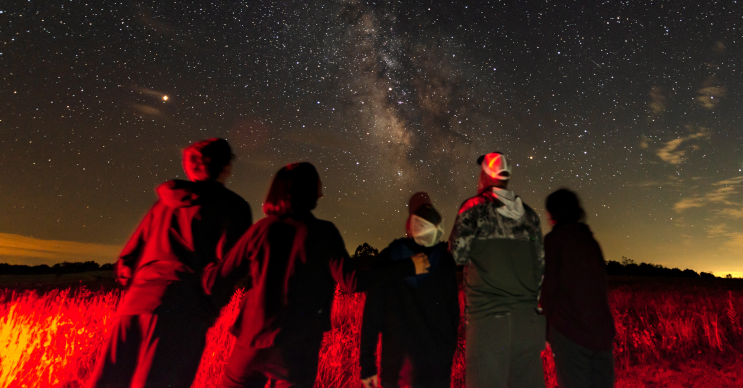Archives
June 2024
Categories
All
|
Back to Blog
Image credit: M. O'Neill / NPS 766 words / 3-minute read Many people are feeling stressed out these days. In the wake of the COVID-19 pandemic and with major economic and political uncertainties ahead, it's understandable that so many people experience anxiety. The frenetic pace of life enabled by technology disconnects us from our roots in nature. As professionals debate the reality of 'nature deficit disorder', an increasing number of people look for solace in the natural world. Can access to a clear, dark night sky, and the awe it inspires, actually make us feel happier? The psychology of wonderAs a practicing psychotherapist, Ada Blair found herself asking that very question a few years ago. "I have a longstanding interest in how encounters with nature, including the sky, may positively impact wellbeing and even lead to transformation," she says. Having spent time on Sark, a small island in the English Channel that became an International Dark Sky Community in 2011, she experienced it firsthand. She wondered if the effect would stand up to scientific investigation. Blair found that the dark nights on Sark, which has almost no electric lighting, led residents to "a widespread belief that observing the night sky results in positive (and sometimes transformative) feelings." Her interviews with islanders revealed an internalized idea that their sense of wellbeing was in part supported by ready access to a dark night sky. Even before Blair began her investigation, there was evidence that exposure to artificial light at night influenced mental health. Higher levels of light at night correlate with a variety of disorders, [1,2] ranging from insomnia to depression. That in turn suggests that access to nighttime darkness is just as important to maintain good health. But could exposure to cosmic light also influence our sense of wellbeing? Conquering fear (of the dark)We don't yet have a lot of scientific evidence to establish a strong relationship between dark skies and happiness. But Dajana Bjelajac, of the University of Novi Sad, Serbia, and her co-authors see signs of a deep connection. "The relationship between humans and natural darkness has always been a dreadful one," they write. "People would admire the heavens, but at the same time, as diurnal beings, we have been and still are relentlessly searching for the best method to tame the night and bring the light into it." [3] Darkness can be terrifying for some people, although the source of that fear may have to do with a sense of vulnerability. Fear of darkness may equate to a fear of being unable to escape perceived danger. [4,5] If people sense that they are in safe spaces at night, their anxiety can ease and they are then able to enjoy the night sky. The effect of living in light polluted places like cities might influence this: when people fear for their safety in cities, they can transfer that fear to rural places. A safe space to be happyAstrotourism can create safe outdoor spaces at night for participants to shed some of that fear and enjoy the wonder of the night sky. It brings people closer to nature, which can further ease fear and promote feelings of safety. Given the lockdowns of the past few years, people are ready get back out into the world and experience new and varied forms of tourism. Some experiences, like dark night skies, may even help heal some of the trauma many have felt. In protected places accessible to the public, like certified International Dark Sky Places, people can find the sense of security they need to have such experiences. It can be something they share with friends and family, much as people thousands of years ago did when dark night skies loomed larger in human culture than they do today. Even fleeting glimpses of starry skies may be meaningful. Recent research results suggest that quality of nature experiences, rather than their frequency or duration, is more reliably predictive of mental health and wellbeing outcomes. [6] In "The Value of the Night Sky", economist Terrell Gallaway writes of the different ways we can look at natural nighttime darkness as a natural and economic resource. "The night sky is a superlatively wondrous and deeply threatened natural asset," he writes. "As an asset, the night sky is extraordinary in many ways beyond its obvious beauty and grandeur." The senses of wonder and awe that the night sky evoke might be the tonic that a weary world needs in troubled times. Whether it's conservation planning, field surveys or lighting policy formulation, we can help your achieve your goals in protecting the night. Contact us today to find out more. References[1] Yu, Z., Hu, N., Du, Y., Wang, H., Pu, L., Zhang, X., Pan, D., He, X., & Li, J. (2022). Association of outdoor artificial light at night with mental health among China adults: a prospective ecology study. Environmental Science and Pollution Research (Vol. 29, Issue 54, pp. 82286–82296). https://doi.org/10.1007/s11356-022-21587-y
[2] Tancredi, S., Urbano, T., Vinceti, M., & Filippini, T. (2022). Artificial light at night and risk of mental disorders: A systematic review. Science of The Total Environment (Vol. 833, p. 155185). https://doi.org/10.1016/j.scitotenv.2022.155185 [3] Bjelajac, D., Đerčan, B., & Kovačić, S. (2020). Dark skies and dark screens as a precondition for astronomy tourism and general well-being. Information Technology & Tourism (Vol. 23, Issue 1, pp. 19–43). https://doi.org/10.1007/s40558-020-00189-9 [4] Boomsma, C., & Steg, L. (2012). Feeling Safe in the Dark: Examining the Effect of Entrapment, Lighting Levels, and Gender on Feelings of Safety and Lighting Policy Acceptability. Environment and Behavior (Vol. 46, Issue 2, pp. 193–212). https://doi.org/10.1177/0013916512453838 [5] Blöbaum, A., & Hunecke, M. (2005). Perceived Danger in Urban Public Space. Environment and Behavior (Vol. 37, Issue 4, pp. 465–486). https://doi.org/10.1177/0013916504269643 [6] Richardson, M., Passmore, H.-A., Lumber, R., Thomas, R., & Hunt, A. (2021). Moments, not minutes: The nature-wellbeing relationship. International Journal of Wellbeing (Vol. 11, Issue 1, pp. 8–33). https://doi.org/10.5502/ijw.v11i1.1267
0 Comments
Read More
Your comment will be posted after it is approved.
Leave a Reply. |
 RSS Feed
RSS Feed

